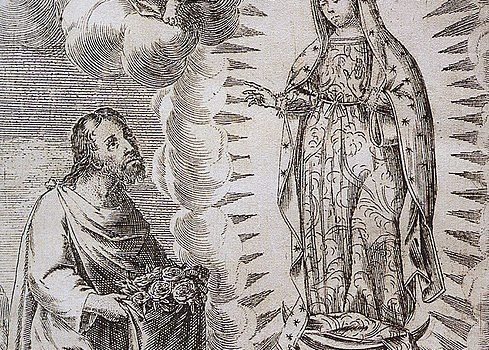On December 9, 1531, Juan Diego, a 57-year-old Aztec, was taking his daily route to Mass. Walking by Tepeyac Hill, he heard beautiful music, like choirs of angels singing. He stopped to listen. The music stopped, but he then heard the sweetest voice he’d ever heard beckoning him, “Juan, Juan Diego, Juanito!” There before him stood a most beautiful young woman, a Mexican girl who looked like an Aztec princess. She was dressed in an embroidered scarlet gown. Over her head and shoulders hung a deep jade-colored mantle covered with golden stars and she was standing on a maroon crescent, held above the ground by an angel.
“Dear little son, I love you,” she said. “I want you to know who I am. I am the ever-Virgin Mary, Mother of the true God who gives life.” She then requested that Juan go to the bishop and request that a chapel be built on the hill for the Mexican natives for whom she expressed a special love. Juan rushed to do as she asked, and was able to get in to see the bishop. He was, however, dismissed without an answer.
On his second attempt the bishop asked him to bring proof that he had indeed seen the Mother of God. Juan left excited, feeling sure that the Blessed Mother would give him this proof. The next morning, though, before Juan could go and meet with the Virgin, he found his only surviving relative, an uncle, seriously ill. Juan felt his first duty was to bring a priest to his dying uncle and so he decided to take another route so as not to see the Virgin and thus be delayed. But the Blessed Mother intercepted him on the path and assured him that his uncle would recover. She then instructed him to gather flowers that were growing on the hilltop in his tilma (shirt) and carry them to the bishop. The Madonna arranged the roses, tied the corners and asked him not to release his shirt until he reached the bishop.
When Juan stood before the bishop and untied his shirt, releasing the flowers, the bishop didn’t seem to notice them. Instead, staring at Juan’s shirt, he fell to his knees with tears streaming down his face. Perplexed, Juan looked down at his shirt and saw that the Virgin had given him a sign even more miraculous than roses growing on the side of a mountain in winter. She had left an image of herself on his tilma, looking exactly as he had seen her. And when Juan returned home, he found that his uncle’s health had been completely restored. The Madonna had appeared to his uncle, as well.
This simple man of great faith and courage reminds us this Advent what it means to be an instrument of the Lord. Juan Diego was canonized in Mexico City by Pope John Paul II in July 2002.
Lessons
The chapel that the Virgin requested was quickly built. The image she left has been given the name of Our Lady of Guadalupe. In the following seven years after this apparition, eight million formerly pagan Aztec Indians were baptized and became Christians. Today, an average of 1,500 pilgrims kneel daily before the miraculous tilma, which has sustained its perfect image for almost 500 years at the new Basilica of Our Lady of Guadalupe in Mexico City.
From Johnnette Benkovic’s Graceful Living: Meditations to Help You Grow Closer to God Day by Day
I am a nobody, I am a small rope, a tiny ladder, the tail end, a leaf.
— St. Juan Diego to the Our Lady of Guadalupe
St. Juan Diego, who describes himself as a “nobody,” a “small rope,” a “tiny ladder,” the “tail end,” a “leaf,” was the instrument Our Lady of Guadalupe chose to join her in one of the greatest moments in evangelization. How do I describe myself? Am I too big to work with Our Lady? How can I exercise the virtue of humility to become smaller?
Prayer
Saint Juan, you now enjoy the beatific vision of God and the company of our beautiful Mother Mary. On this, your feast day, we ask that you and Our Lady of Guadalupe pray for us that we may never fear to boldly proclaim the truth in the hope that if each of us does our part, no matter how small, millions will come to know God.














